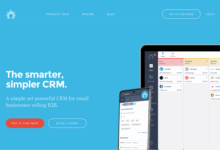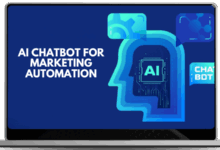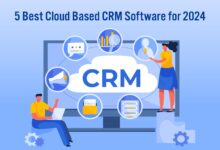AI-Powered CRM Software: A Comprehensive Guide
AI-Powered CRM Software is revolutionizing how businesses manage customer relationships. This powerful technology leverages artificial intelligence to automate tasks, analyze data, and personalize interactions, ultimately boosting efficiency and profitability. We’ll explore the core functionalities, benefits, challenges, and future trends of this transformative technology, providing a clear understanding of its impact on modern business.
From predictive lead scoring that identifies high-potential customers to AI-driven chatbots providing instant support, AI-powered CRMs offer a significant competitive advantage. This guide delves into real-world applications, highlighting successful implementations and addressing potential concerns surrounding data privacy and integration complexities. We aim to equip you with the knowledge to effectively evaluate and implement AI-powered CRM solutions within your organization.
Defining AI-Powered CRM Software
AI-powered CRM software represents a significant evolution in customer relationship management, leveraging artificial intelligence to automate tasks, analyze data, and ultimately improve business outcomes. It goes beyond the capabilities of traditional CRM systems by incorporating machine learning and predictive analytics to offer more insightful and proactive customer interactions.
Core functionalities of AI-powered CRM software encompass a wide range of capabilities designed to enhance efficiency and effectiveness in managing customer relationships. These functionalities extend beyond simple data storage and retrieval, integrating sophisticated algorithms to provide actionable insights and automate repetitive tasks.
Key Differences Between Traditional and AI-Powered CRM
Traditional CRM systems primarily focus on organizing and managing customer data. They provide tools for tracking interactions, managing contacts, and generating reports. However, they lack the predictive and analytical capabilities offered by AI-powered CRM. AI-powered CRM, in contrast, uses machine learning to analyze data, predict customer behavior, and automate processes, leading to more personalized interactions and improved sales outcomes. For example, a traditional CRM might track customer purchase history, while an AI-powered CRM could predict future purchases based on that history and similar customer profiles.
Examples of AI Features in CRM Systems
Several AI features are integrated into modern CRM systems to enhance their capabilities and provide valuable insights.
Predictive analytics uses historical data and machine learning algorithms to forecast future trends and behaviors. For instance, it can predict customer churn, identify high-potential leads, or optimize pricing strategies. Lead scoring automatically assigns scores to leads based on their likelihood of conversion, allowing sales teams to prioritize their efforts on the most promising prospects. This saves time and resources by focusing on qualified leads. Chatbot integration provides instant customer support and answers common queries, improving customer satisfaction and freeing up human agents to handle more complex issues. For example, a chatbot could handle basic order tracking or answer frequently asked questions about product features.
Comparison of Leading AI-Powered CRM Platforms
The following table compares three leading AI-powered CRM platforms, focusing on pricing, features, and target audience. Note that pricing can vary significantly based on the number of users, features selected, and other factors. The features listed are a selection of key offerings, and each platform offers a broader suite of capabilities.
| Platform | Pricing | Key Features | Target Audience |
|---|---|---|---|
| Salesforce Einstein | Varies widely, based on edition and features. Contact Salesforce for pricing. | Predictive lead scoring, Einstein Activity Capture, Einstein Opportunity Scoring, Einstein Case Classification | Large enterprises, mid-sized businesses with complex sales processes. |
| Microsoft Dynamics 365 AI | Varies widely, based on edition and features. Contact Microsoft for pricing. | Predictive analytics, AI-driven customer service, intelligent chatbots, sales insights | Businesses of all sizes, particularly those already using the Microsoft ecosystem. |
| HubSpot CRM | Offers a free version with limited features, paid plans for advanced functionalities. | Lead scoring, chatbot integration, sales forecasting, contact management | Small and medium-sized businesses, startups. |
Benefits and Applications of AI-Powered CRM
AI-powered CRM systems are transforming how businesses interact with customers, driving significant improvements in efficiency, productivity, and customer satisfaction. By leveraging artificial intelligence, these systems automate tasks, provide insightful analytics, and personalize customer experiences in ways previously unimaginable. This leads to tangible benefits across various departments and ultimately boosts the bottom line.
AI’s integration into CRM significantly impacts various aspects of a business, offering a competitive edge in today’s market. The following sections detail these key advantages and their practical applications.
Impact of AI on Sales Team Productivity
AI streamlines the sales process, freeing up sales representatives to focus on higher-value activities like building relationships and closing deals. AI-powered features such as lead scoring, predictive analytics, and automated email sequences significantly improve sales team efficiency. For example, AI can analyze lead data to identify those most likely to convert, allowing sales representatives to prioritize their efforts and increase conversion rates. Automated email sequences nurture leads and keep them engaged throughout the sales funnel, reducing the manual effort required for follow-up. Predictive analytics can forecast future sales trends, enabling proactive adjustments to sales strategies and resource allocation. This data-driven approach allows for optimized sales processes and better resource management.
AI Enhancement of Customer Service and Support
AI significantly enhances customer service and support through features like chatbots, sentiment analysis, and automated ticket routing. AI-powered chatbots provide instant support, answering common customer queries and resolving simple issues 24/7, reducing wait times and improving customer satisfaction. Sentiment analysis tools monitor customer interactions to identify negative sentiment, allowing businesses to proactively address issues and prevent escalation. Automated ticket routing ensures that customer inquiries are directed to the most appropriate support agent, improving response times and resolution rates. This leads to improved customer satisfaction and loyalty.
Case Studies Demonstrating Return on Investment (ROI) of AI-Powered CRM
Several companies have reported significant ROI from implementing AI-powered CRM. For instance, a large telecommunications company saw a 25% increase in sales conversion rates after implementing an AI-powered lead scoring system. Another example is a retail company that reduced customer service costs by 15% by utilizing AI-powered chatbots to handle a significant portion of customer inquiries. These successes highlight the potential for substantial financial returns on investment in AI-powered CRM solutions. While specific ROI figures vary based on implementation and industry, the consistent trend shows improved efficiency and reduced operational costs.
Industries Benefiting Most from AI-Powered CRM Implementation
AI-powered CRM benefits numerous industries, but some see more pronounced advantages. The financial services sector utilizes AI for fraud detection and risk management, enhancing security and customer trust. E-commerce businesses leverage AI for personalized recommendations and targeted marketing, driving sales and increasing customer lifetime value. Healthcare providers use AI to improve patient engagement and streamline administrative tasks. These are just a few examples; many industries can benefit from improved customer relationship management through AI.
Hypothetical Scenario: Improved Customer Retention Through AI-Driven Personalization
Imagine an online clothing retailer using AI to analyze customer purchase history, browsing behavior, and social media activity. The AI identifies a customer who frequently purchases athletic wear and shows a preference for specific brands on their social media. The system then automatically sends this customer personalized recommendations for new athletic wear releases from their preferred brands, along with exclusive discounts and early access to sales. This targeted approach increases customer engagement, leading to repeat purchases and improved customer loyalty. This personalized experience fosters a stronger customer relationship, ultimately improving retention rates.
Challenges and Considerations in Implementing AI-Powered CRM
Implementing AI-powered CRM systems offers significant advantages, but it’s crucial to acknowledge and address the potential challenges to ensure a successful integration and maximize return on investment. A thoughtful approach to planning and execution is vital to avoid pitfalls and fully realize the benefits of AI within your CRM strategy.
Integration Challenges with Existing Systems
Integrating AI-powered CRM solutions with existing systems can present significant hurdles. Legacy systems, built on outdated technologies, often lack the APIs or data structures necessary for seamless integration with modern AI platforms. Data migration can be complex and time-consuming, requiring careful planning and potentially significant upfront investment. Inconsistencies in data formats across different systems also need to be addressed to ensure the AI algorithms receive clean and accurate data for processing. For example, integrating a new AI-driven lead scoring system with an older sales management system might require extensive data mapping and transformation to ensure compatibility. This process often necessitates specialized technical expertise and careful project management.
Data Privacy and Security Concerns
AI-powered CRM systems process vast amounts of sensitive customer data, raising significant privacy and security concerns. Compliance with regulations like GDPR and CCPA is paramount. Robust security measures, including data encryption, access controls, and regular security audits, are essential to protect customer information from unauthorized access or breaches. Furthermore, the use of AI algorithms itself can introduce new vulnerabilities if not properly secured and monitored. For instance, a poorly secured AI model could be vulnerable to adversarial attacks, where malicious actors manipulate the input data to obtain incorrect or biased predictions. Therefore, a comprehensive security strategy is crucial, including employee training on data handling and security best practices.
Cost-Benefit Analysis of AI-Powered CRM Solutions
The costs and benefits of different AI-powered CRM solutions vary widely depending on factors such as the size of the organization, the complexity of the implementation, and the specific features required. Cloud-based solutions often offer lower upfront costs but may involve ongoing subscription fees. On-premise solutions require a larger initial investment but offer greater control over data and infrastructure. The benefits include improved sales efficiency, enhanced customer service, and better decision-making. However, it’s crucial to carefully weigh the costs of implementation, maintenance, and training against the potential return on investment. For example, a small business might find a simpler, less expensive AI-powered CRM sufficient, while a large enterprise might require a more sophisticated and costly solution with extensive customization.
Risks of Over-Reliance on AI-Driven Predictions
While AI-driven predictions can be valuable, over-reliance on them can lead to significant risks. AI models are only as good as the data they are trained on, and biased or incomplete data can lead to inaccurate or misleading predictions. It’s crucial to maintain human oversight and critical thinking when interpreting AI-generated insights. For instance, an AI model predicting customer churn might overlook crucial contextual factors, leading to incorrect decisions about customer retention strategies. Regularly auditing and validating the AI model’s performance and ensuring human review of its outputs are vital to mitigate these risks.
Best Practices for Successful AI-Powered CRM Implementation
Successful AI-powered CRM implementation requires a structured approach. This includes defining clear objectives, selecting the right AI-powered CRM solution, ensuring data quality and accessibility, establishing robust security measures, providing adequate training for employees, and monitoring and evaluating the system’s performance. Regularly reviewing and updating the AI model is also crucial to maintain its accuracy and effectiveness. A phased implementation approach, starting with a pilot project, can help mitigate risks and allow for iterative improvements. Furthermore, establishing key performance indicators (KPIs) to measure the success of the implementation is vital for demonstrating the return on investment and identifying areas for improvement. For example, tracking metrics like lead conversion rates, customer satisfaction scores, and sales growth can provide valuable insights into the impact of the AI-powered CRM system.
Future Trends in AI-Powered CRM
The future of AI in customer relationship management (CRM) is poised for explosive growth, driven by advancements in machine learning, natural language processing, and the integration of emerging technologies. We’re moving beyond simple automation towards a future where AI proactively anticipates customer needs and drives personalized experiences at scale.
AI’s role in CRM will evolve from a supporting function to a strategic core. Instead of simply automating tasks, AI will become the decision-making engine, providing real-time insights and predictive analytics that enable businesses to optimize every customer interaction. This will lead to hyper-personalization, proactive customer service, and improved efficiency across all CRM functions.
The Impact of Emerging Technologies on AI-Powered CRM
The convergence of AI with other emerging technologies will significantly enhance the capabilities of AI-powered CRM systems. For example, the integration of blockchain technology can enhance data security and transparency, ensuring data integrity and building trust with customers. Simultaneously, the Internet of Things (IoT) will provide a wealth of real-time customer data from connected devices, enabling even more precise and personalized interactions. Imagine a smart refrigerator automatically ordering groceries when supplies run low, triggering a personalized marketing campaign from the grocery store’s AI-powered CRM. This seamless integration creates a unified customer experience, maximizing engagement and loyalty.
Evolving Ethical Considerations Surrounding AI in CRM
The increasing sophistication of AI in CRM raises important ethical considerations. Data privacy and security are paramount. AI algorithms must be designed to be fair and unbiased, avoiding discriminatory practices based on factors like race, gender, or location. Transparency in how AI makes decisions is also crucial, ensuring customers understand how their data is being used and why certain actions are taken. For example, explainable AI (XAI) techniques are gaining traction to address the “black box” problem, offering insights into the reasoning behind AI-driven recommendations. Robust regulatory frameworks and industry best practices are essential to mitigate potential risks and build customer trust.
Innovative Applications of AI in CRM
AI is already driving innovation in CRM through various applications. Predictive analytics allows businesses to anticipate customer churn and proactively address potential issues, improving customer retention. AI-powered chatbots provide instant customer support, improving response times and freeing up human agents to handle more complex issues. Sentiment analysis helps businesses understand customer feedback, identifying areas for improvement and proactively addressing negative experiences. Salesforce Einstein, for example, leverages AI to personalize sales processes, automate tasks, and predict sales opportunities. Similarly, Microsoft Dynamics 365 uses AI for customer service, marketing, and sales, enhancing efficiency and effectiveness.
Visual Representation of the Evolution of AI-Powered CRM Over the Next 5 Years
Imagine a vibrant, multi-layered sphere representing the current state of AI-powered CRM. It’s relatively small, with distinct sections representing basic automation, rudimentary predictive analytics, and simple chatbot interactions. Over the next five years, this sphere expands dramatically. The layers become more complex and interwoven, reflecting the integration of blockchain, IoT, and advanced machine learning techniques. The color palette shifts from muted tones to a vibrant spectrum, signifying the increasing personalization and sophistication of the system. New layers emerge, representing capabilities like proactive customer engagement, hyper-personalized marketing campaigns driven by real-time data from connected devices, and completely autonomous customer service interactions powered by advanced natural language processing. The overall impression is one of dynamic growth and seamless integration, signifying a powerful and transformative evolution of AI’s role in customer relationship management.
AI-Powered CRM and Customer Experience
AI-powered CRM systems are revolutionizing how businesses interact with their customers, leading to more personalized experiences and improved customer satisfaction. By leveraging the power of artificial intelligence, companies can gain deeper insights into customer behavior, preferences, and needs, enabling them to tailor their interactions and offerings more effectively. This ultimately translates into stronger customer relationships and increased business success.
AI significantly enhances the customer experience across various touchpoints. The ability to analyze vast amounts of data allows for a level of personalization previously unimaginable, fostering stronger customer loyalty and advocacy.
AI-Enhanced Personalized Customer Interactions
AI enables personalized customer interactions by analyzing individual customer data, including purchase history, website activity, and customer service interactions. This analysis allows businesses to anticipate customer needs and offer relevant products, services, or information at the right time and through the preferred channel. For example, an e-commerce platform might use AI to recommend products based on a customer’s browsing history or past purchases, leading to increased sales and a more satisfying shopping experience. Furthermore, AI can personalize email marketing campaigns, ensuring that each customer receives messages tailored to their interests and preferences. This targeted approach increases engagement and reduces the likelihood of customers feeling overwhelmed by irrelevant communications.
AI’s Role in Customer Segmentation and Targeting
AI significantly improves customer segmentation and targeting by identifying distinct customer groups based on shared characteristics and behaviors. Traditional segmentation methods often rely on limited data points, leading to broad generalizations. AI, however, can analyze vast datasets to uncover subtle patterns and create highly granular segments. For instance, an AI-powered CRM could segment customers based on their lifetime value, purchase frequency, or engagement with marketing campaigns. This allows businesses to tailor their marketing efforts and product offerings to the specific needs and preferences of each segment, maximizing ROI and improving conversion rates. This precision targeting reduces wasted marketing spend and improves the overall effectiveness of marketing campaigns.
Examples of AI-Driven Customer Journey Mapping
AI facilitates the creation of detailed customer journey maps by analyzing customer interactions across multiple channels. This allows businesses to identify pain points, areas for improvement, and opportunities for personalization. For example, by analyzing website analytics, social media interactions, and customer service data, a company can map the entire customer journey, from initial awareness to post-purchase engagement. This visualization reveals areas where the customer experience can be optimized, leading to improved customer satisfaction and loyalty. A clear example would be identifying a drop-off point in the online checkout process, prompting the business to simplify the process or address any confusing aspects.
AI-Powered Chatbots and Improved Customer Service
AI-powered chatbots are transforming customer service by providing instant support and resolving issues efficiently. Their benefits include:
- 24/7 Availability: Chatbots are available around the clock, providing immediate assistance to customers regardless of time zone or business hours.
- Increased Efficiency: They can handle a high volume of inquiries simultaneously, freeing up human agents to focus on more complex issues.
- Personalized Interactions: AI-powered chatbots can access customer data to personalize interactions, providing relevant information and solutions.
- Improved First Contact Resolution: Chatbots are often programmed to resolve simple issues autonomously, reducing resolution times and improving customer satisfaction.
- Cost Savings: By automating routine tasks, chatbots reduce the need for a large customer service team, leading to significant cost savings.
For instance, a bank might use an AI-powered chatbot to answer frequently asked questions about account balances, transaction history, or online banking features. This frees up human agents to handle more complex issues, such as resolving disputes or assisting with account security concerns.
Ending Remarks
In conclusion, AI-powered CRM software represents a significant advancement in customer relationship management, offering unparalleled opportunities for businesses to optimize their operations and enhance customer experiences. While challenges exist regarding implementation and ethical considerations, the potential benefits—increased efficiency, improved customer satisfaction, and enhanced profitability—far outweigh the risks. By carefully considering the factors discussed and adopting best practices, organizations can leverage AI-powered CRM to achieve sustainable growth and competitive success in today’s dynamic market.






